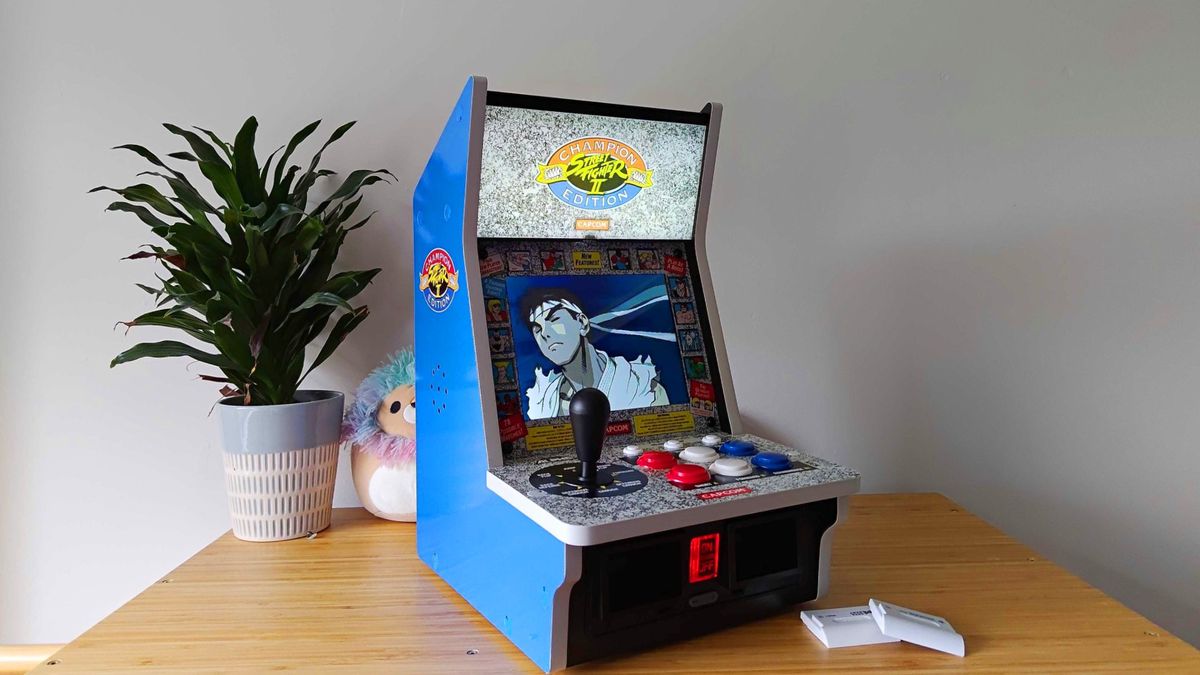12DOVE Verdict
The Evercade Alpha is a fantastic mini arcade machine that benefits from the platform's expansive cartridge library. Its sharp 8-inch screen, punchy speakers, and superb arcade controls all make for a perfect at-home homage to the coin-ops era of gaming, and being able to use a wide variety of USB controllers adds a layer of console versatility. Skipping on HDMI output is a bit of a shame, but it’s not enough to keep this adorable cabinet from greatness.
Pros
- +
Compatible with Evercade cartridges
- +
Slick built-in arcade controls
- +
Authentic design with a modern twist
- +
Fantastic screen quality
- +
Punchy built-in speakers
Cons
- -
No HDMI output
Why you can trust 12DOVE
As soon as I caught wind of the Evercade Alpha, I was pretty convinced I was going to adore the mini arcade machine. That’s not just because it takes one of my favorite gaming handhelds from last year and scales it up into an all-in-one retro console battle station. In fact, it’s not even down to the pure love that’s gone into the bartop unit’s design. Ultimately, it’s the fact that this cabinet doesn’t force me to invest in something with just a few games installed, allowing me to treat it like a full blown platform.
Of course, if you’re savvy with other Evercade devices like the Super Pocket, you’ll know that it is just as much of a platform as the PS5 or Xbox Series X. Coming in at $249.99 / £229.99, it’s safe to say the Evercade Alpha is almost as much of an investment too. But, unlike Sony’s expensive adventure box, this arcade machine makes me feel like I’m standing on the sticky carpet of my local amusement park, clutching a bundle of prize tickets, waiting for a go on Street Fighter 2.
I’ve been testing the Evercade Alpha Street Fighter 2 edition, but it’s worth noting there’s a Mega Man version too. The only difference between the two is their get-up and built-in games, and I’ve no doubt we’ll see more flavors in the future. However, getting hands-on with the former Capcom tribute feels more appropriate since we’re talking about a system that embodies arcade gaming, and Blaze has pretty much nailed squeezing that vibe into a compact package.
Design


Measuring 16.5 inches tall, the Evercade Alpha is firmly what I’d call a bartop cabinet. This is, understandably, a popular format with now-adults looking to fulfill their dream of having a full-blown arcade machine in their home, and I’m certainly one of them. Naturally, I’d love to have an authentic full-sized unit in my kitchen, but Blaze’s mini system goes the extra mile to provide the same experience without replacing my refrigerator. I live in a small two-bedroom house and compromises always have to be made.
For starters, the Alpha comes dressed almost exactly like an original Street Fighter 2 arcade machine. I’ve actually restored an old unit to be used at a local gaming event, so I’m more than familiar with the finer details of the OG cabinet. Elements like the bezel around the 8-inch screen, complete with a janky ‘80s roster of older Capcom designs, are probably enough to please most fans of the series, but the unit goes the extra mile by including an illuminated marquee at the top.
The part that really has me excited is that the Evercade Alpha’s top banner is swappable. I love the idea of being able to dress up the cabinet like any retro game that takes my fancy.For most people that’ll mean using one of the three included banners, but I could see myself going the extra mile. Put it this way, if Golden Axe: The Revenge of Death Adder ever makes its way to the platform, I can’t promise I won’t turn this unit into an homage.
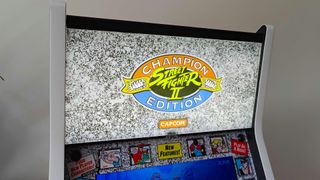
Moving down the system, you’ll also find a glowing faux coin slot that serves as the machine’s power button. This is a pretty nifty touch that’ll be lost on anyone who wasn’t around for the coin-ops era, and it’s the exact kind of subtle design I want to see in a premium arcade replica. It also helps prevent other modern inclusions, like the dual Evercade cart slots, volume rocker, and USB ports at the front, from sticking out, preserving the vibe that this could be an original piece of kit.
The back and sizes of the Alpha aren’t exactly riveting, as the side panels use subtle blue decals with the Street Fighter 2: Champion Edition logo on each side. This is somewhat true to the original design, although most of the versions I’ve come across are actually black. Still, the Evercade unit is going with authenticity over wow-factor for this version specifically, and I can respect that. Would I have enjoyed some more cursed Street Fighter artwork? Probably, but it’s too easy to cramp the style of a nostalgia piece like this with too much to look at.
The Alpha uses a nice blend of wood and plastic, resulting in something that feels surprisingly like an OG machine to the touch. That’s more important than you’d think since you’ll be spending a lot of time with your wrists and hands resting on its surface, and going with an all-plastic body would hit the wrong notes in terms of physical experience. Sure, it might have brought the price of the Evercade machine down a tad, but this system’s target audience would rather pay extra for the right materials.
Features
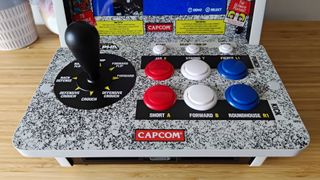
The Alpha isn’t remotely the first modern arcade machine on the block, meaning it has to go the extra mile to justify its existence. And oh boy, Blaze has certainly done that with this tabletop menace, making sure to squeeze almost every element you’d want in something aiming to fool your retro senses.
Out of everything, controls are the one aspect that can make or break an arcade machine replica. Understandably, the fighting game community looks for an extremely high standard of buttons and sticks, and while I’d be lying if I said I was just as fussy, the “competition grade” switches in this unit feel pretty close to Sanwa parts to me. I’ll circle back to how they actually play when talking about performance, but including quality parts like this is a strong selling point.
I’ve already touched on the glowing marquee, but it’s a feature that would actually push me to buy an Alpha if I spotted one on display. The subtle glow is well diffused and serves to highlight the gorgeous artwork on top rather than blind you with LEDs, and while it doesn’t quite replicate the often uneven glow of an old fluorescent tube, I don’t think I’d want it to. You’ll notice a pattern throughout my Alpha discussion in regards to blending old elements with elevated modern tech, and even the machine’s illumination is part of that.
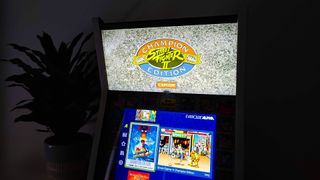
One of the more prominent parts of the Alpha is undeniably its 8-inch IPS display, serving in place of the old CRT in an original machine. It’s 4:3, meaning it’s suited to most retro games and Evercade releases, and it’s sharp enough to provide the pixelated punch you’ll want from arcade games. Part of me would have liked to see Blaze replicate the curve of an old screen in some way, but that’s more me being a nerd than a dealbreaker.
Before I get too caught up on the arcade side of things, I should emphasize that this is an Evercade console. That effectively means it’s designed around running the system’s expansive collection of cartridges, and this machine can take two at a time. The Alpha effectively mimics the setup of the Evercade VS, making use of a similar operating system and settings.
Some of the usual suspects within an Evercade settings menu include a range of visual filters like scanlines, aspect ratio adjustments, and bezels for anything not in 4:3. There’s nothing too heavy to choose from on the system, which helps keep the process of playing more streamlined and approachable for those not into manual emulation.


One extra that has thankfully made it to the Alpha is the ability to map USB controllers, meaning you can use virtually any modern gamepad you like. This will naturally save you from forking out for other Evercade pads, but it also just makes the experience of playing classics on the mini arcade feel that bit more authentic. I’ll be testing a bunch of my favorites using a wireless Sega Genesis pad and my wired PC Engine mini controller since both work wonderfully with this system.
The Alpha has built-in Wi-Fi, just like many other modern mini arcade systems, but it’s not quite used in the same way as Arcade1Up machines. Rather than using the power of the internet for online multiplayer, connectivity is simply used to fetch OS updates and keep tabs on upcoming Evercade releases. You won’t be able to download any games since that’d defeat the whole ethos of maintaining a physical cartridge library in 2024, but it’s still a way to bring some of the digital convenience of modern console gaming.
As well stacked as the Evercade Alpha is in terms of features, there’s one thing missing that would have helped to achieve perfection in my eyes – HDMI output. Yes, I know it’s meant to be used as a standalone machine rather than a home console, but it could have been both. Being able to hook up to an external gaming TV or monitor would have rounded out this system’s versatility and helped it sit at the top of the Evercade food chain. Even Blaze’s first gaming handheld had mini-HDMI out, and including it with the Alpha would have helped protect its lofty price tag from potential scrutiny.
Performance

Going into testing, I was fairly confident that the Evercade Alpha would hold up performance-wise. I’ve yet to be let down by Blaze’s method of emulation, and the robust build quality of the machine boosted my physical expectations before even pressing the power button. Upon powering everything up, the booming sound of the unit’s integrated speakers and vivid screen glow got me properly excited for the sessions ahead.
I kicked off my arcade adventures by focussing on the cabinet’s six Capcom games. If you enjoy the publisher’s back catalog of fighters, you’ll be pleased with what’s included here, and I know many Street Fighter 2 fans in my life who’d be thrilled to play the Street Fighter Alpha series for the first time on this machine. I was slightly bummed out that Third Strike isn’t a thing on Evercade yet, but with Giga carts now bringing beefier games to the platform, that’ll be a performance chat for another time.
Every included game runs on the Alpha without a hitch, with no instances of frame dips, slow down, or emulation-based glitches in sight. Again, no surprises there since the Super Pocket uses the same tech to achieve accurate gameplay, but I’m still pleased to see the platform holding up in its new form factor. The machine’s visuals and audio in turn highlight how nice the 8-inch IPS screen is by allowing it to display sharp, vibrant pixels without any performance distractions.
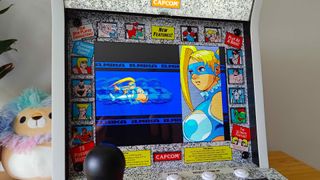
I spend a lot of time either rotting my eyeballs with CRT TVs or reviewing fancy OLED gaming monitors, so I wasn’t too sure if I’d be disappointed by the Evercade Alpha’s screen. However, Blaze has managed to choose a panel that elevates sprites perfectly with excellent brightness while avoiding issues like light bleed or banding. These are both horrors I’ve had to deal with when playing some of my favorite outings on full-size replica machines in bars and retail stores, and it’s really cool to see a much smaller home system steal their lunch money.
I’ve been playing Truxton 2 on the Alpha via the Toaplan Arcade 3 set. At one point in my life, I used to visit a local game shop to play the vertical shooter on a beat-up multi-cade since it felt like an authentic way to do so. Evercade’s machine has since made me realize how crumby that experience was with its punchy bassy speakers and sharp visuals revealing the disservice done by that old cabinet’s tinny and blurry assault on the senses.
It’s not just the screen that puts many other modern arcade cabinets to shame – those controls slap too. Perhaps it’d be fairer to sit the Alpha in a busy toyshop for a year and let children decimate its switches with aggressive button bashing, but I’m still convinced Blaze’s choice of switches is top-notch.


In Street Fighter Alpha 3, I was able to pull off Cammy’s Spiral Arrow and Cannon Spike attacks just like I would with any other fight stick, further cementing the feeling of authenticity. I’d even go as far to say that I prefer using the mini arcade to a proper standalone set of buttons since the inherent weight of the machine helps keep things stable. It really helps that the buttons and sticks are light, tactile, and clearly designed with fighting games in mind, which isn’t always a given with arcade replicas like this.
I started to realize how much of a versatile monster the Alpha actually is when I moved on to external cartridges. There are over 500 games available for the system across numerous releases, and exploring different genres on this arcade machine helps all of its elements shine.
Should you buy the Evercade Alpha?
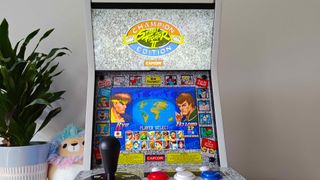
It’s safe to say the Evercade Alpha is a mini arcade scene disruptor, and that’s before you even get to its cartridge support. Its fantastic controls and robust build quality help make the bar top cabinet more than just a talking piece for your gaming room, one that manages to capture the essence of coin-ops hardware using modern tech.
Add in the fact that you can play over 500 games on this arcade machine and you’ve got a system that’ll cater to more than just retro enthusiasts. It’s just a shame that it isn’t armed with HDMI output, as being able to hook the Evercade Alpha up to your living room TV would actually make it a true console challenger.
Perhaps we’ll be treated to an enhanced version that can serve as an all-inclusive Evercade option down the road, but in its current form, the Alpha is still a fantastic arcade machine that goes above and beyond simply serving up nostalgia. I’m honestly hyped to cozy up next to this machine and re-play Legacy of Kain: Soul Reaver for the millionth time, which hammers home its broad appeal and versatility.
Evercade Alpha Street Fighter Edition games
- Street Fighter II: Champion Edition
- Super Street Fighter II Turbo
- Super Puzzle Fighter II Turbo
- Street Figher Alpha: Warriors' Dreams
- Street Fighter Alpha 2
- Street Fighter Alpha 3
How I tested the Evercade Alpha
I used the Evercade Alpha as a standalone arcade machine and a way to play Blaze’s separate cartridge releases for two weeks. During that time, I used the machine’s built-in collection of Street Fighter titles and individual games like Truxton 2 to test the unit’s controls, screen quality, and emulation accuracy, comparing the results to original hardware where possible.
In addition to gameplay tests, I also spent a lot of time casually playing games on the Alpha to assess its overall performance as a gaming machine. Using the bar top cabinet in this way enabled me to get a feel for the unit’s build quality, visual appeal, and features in relation to everyday use and whether it represents value as a retro console.
For more information on how we test retro gadgets and other gizmos, swing by our full 12DOVE hardware policy.

I’ve been messing around with PCs, video game consoles, and tech since before I could speak. Don’t get me wrong, I kickstarted my relationship with technology by jamming a Hot Wheels double-decker bus into my parent’s VCR, but we all have to start somewhere. I even somehow managed to become a walking, talking buyer’s guide at my teenage supermarket job, which helped me accept my career fate. So, rather than try to realise my musician dreams, or see out my University degree, I started running my own retro pop culture site and writing about video games and tech for the likes of TechRadar, The Daily Star, and the BBC before eventually ending up with a job covering graphics card shenanigans at PCGamesN. Now, I’m your friendly neighbourhood Hardware Editor at GamesRadar, and it’s my job to make sure you can kick butt in all your favourite games using the best gaming hardware, whether you’re a sucker for handhelds like the Steam Deck and Nintendo Switch or a hardcore gaming PC enthusiast.

As some analysts "hope" GTA 6 will normalize $100 games, one Baldur's Gate 3 dev points out that "prices haven't risen with inflation"
Leading analysts predict the Nintendo Switch 2 could shift anywhere between 14 million and 20 million units in its first year - if Nintendo can keep up with demand

30 years later, Fallout creator Tim Cain is searching for a legendary D&D player who cheesed an entire competitive dungeon with a lightning-fast Monk build
Most Popular


